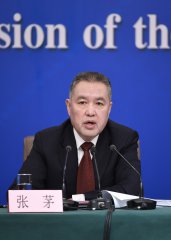The report to the 19th National Congress of the Communist Party of China has pledged to strengthen the creation, protection, and application of intellectual property.
A series of progress were achieved over the past year.
ADMINISTRATIVE, LAW ENFORCEMENT AUTHORITIES
The centralized and unified management of trademarks, patents and geographical indications significantly improved the efficiency of IPR law enforcement.
Around 77,000 cases on patents were handled in the country's administrative law enforcement in 2018, up 15.9 percent from the previous year, while more than 31,000 trademark violation cases were dealt with, involving nearly 546 million yuan (over 80 million U.S. dollars).
Over 2,500 piracy cases were also handled last year, with more efforts put into the film industry.
Customs across the country detained 23.13 million pieces of goods worth 200 million yuan for IPR infringement.
A total of 19,060 counterfeiting cases were solved by public security organs throughout the country, with nearly 28,000 suspects detained.
JUDICIAL AGENCIES
In 2018, Chinese procuratorates approved the arrest of 5,266 people suspected of trademark infringement in 3,100 cases and charged 7,741 people involved in 4,136 such cases.
A total of 304 people were charged for copyright infringement last year, while 56 people were prosecuted for infringing trade secrets.
Prosecutors have also intensified efforts to protect the IPR of online works. More technological means are being used to collect evidence as well as improve the quality and effectiveness of investigation in major and complex cases.
Cooperation has been enhanced among public security, administrative and law enforcement authorities and procuratorial agencies in improving mechanisms of evidence reporting, evidence transfer, technique sharing and case coordination in IPR-related cases.
Chinese courts at all levels concluded 288,000 cases related to IPR of first instance in 2018, up 41.8 percent year on year.
A tribunal for IPR-related cases was set up at the Supreme People's Court last year to further strengthen the judicial protection of IPR.
More efforts were put into the construction of the intellectual property courts in Beijing, Shanghai and Guangzhou, as well as 19 tribunals for IPR-related cases to improve the legal environment for technological innovation.
INTERNATIONAL EXCHANGES
China has been lavishing money on IPR royalties with a 20-year streak of double-digit growth amid efforts to close a longstanding gap in technology and innovation.
China's external payments of IPR royalties rose 24 percent year on year in 2018 to 35.8 billion U.S. dollars, resulting in a deficit of 30.2 billion dollars. The fast expansion represents not only the country's strong demand for advanced technology to support its economic development and industrial upgrading, but also its enhanced IPR protection and respect for innovation.
Moreover, China has been actively participating in multilateral affairs under the World Trade Organization and World Intellectual Property Organization frameworks, and promoting the improvement of international rules concerning IPR.
The National Intellectual Property Administration is now in cooperation with 28 patent offices across the world under the Patent Prosecution Highway, a framework for the examination of patent applications filed to participant offices.






















Latest comments